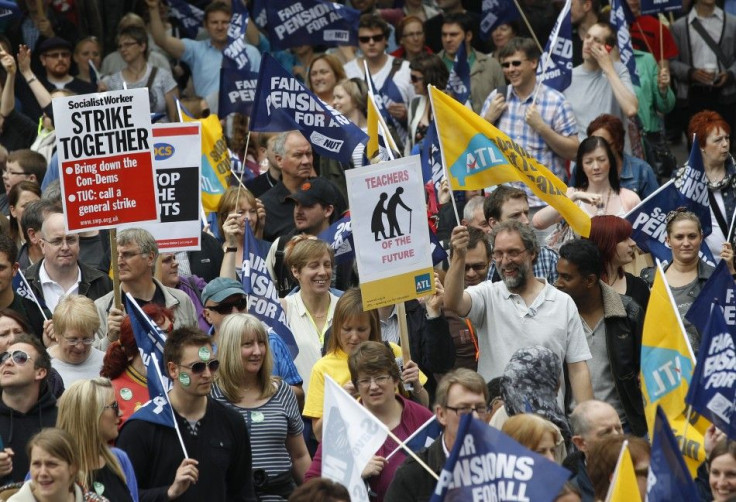Massive Public Sector Strike Waged in UK

Public sector workers all across Britain are neither in their offices nor in schools today. Rather, they are on the streets.
In what is expected to be a 24-hour strike, hundreds of thousands of British workers and union members are staging a massive demonstration against proposed changes to the public pension scheme.
Led by four major academic and public service unions, the strike has closed or partially closed two-thirds of public schools and universities in England and Wales. Many museums are also closed, while a large number of airport and seaport workers have joined the picketers at public squares around the nation.
Causing momentary worry, operators at 999 call centers -- the UK's 911 equivalent -- have joined the strike, but hundreds of police officers have taken up their spots at the phones. In total, 90 percent of civilian police department workers have joined their union's rally.
The strike involves the pension portion of the government's proposed austerity bill which is meant to raise 111 billion pounds. The pension changes would increase the retirement age for public workers from 60 to 66 by 2020 and would require workers to contribute more to their pension funds.
Our members are faced with everything they have ever worked for being taken away from them, Public and Commercial Services Union spokesman Richard Simcox told IBTimes. This can't be right, and cannot go unopposed.
Asking [educators] to pay even more into a pension for reduced benefits is not the way to attract the most intelligent to teach, said University and College Union general secretary Sally Hunt.
There was hope that negotiations between union heads and politicians would render the strike unnecessary, but a meeting with Cabinet Office Minister Francis Maude and Chief Secretary to the Treasury Danny Alexander angered the unions more than it assuaged them.
It was disappointing that the meeting proved to be no different to any of the others -- it was a farce, commented Public and Commercial Services Union General Secretary Mark Serwotka.
This is not a decision that has been taken lightly and it is not [an] action being entered into without proper thought, Hunt said.
Strike action is a last resort. Educators do not like taking strike action. Our chosen vocation is to change lives and transform life chances and we are unlikely militants.
The unions expect to gather 750,000 people together in the strike. The current number of protestors is unknown. The strike began at 6 p.m. (local time) Wednesday night and will last until 6 p.m. Thursday.
People have gathered at key places all over the country. In London, there were demonstrations at Trafalgar Square, as well as in Charing Cross and Westminster.
The strike was expected to have a significant effect on airports and air travel, as customs officials, immigration officers and other airport staff participated in the walkout. However, reports from the UK say that travel is running mostly on schedule and there have been no major delays.
London's Heathrow and Gatwick airports, the country's largest, are meeting government-mandated benchmarks. Lines in the busiest terminals are currently between 30 and 45 minutes long.
While the protests have thus far remained peaceful, the BBC is reporting that 18 people have been arrested in London for offenses including possession of drugs, criminal damage and breach of the peace.
Downing Street has yet to comment as to how the strike affects their view of the pension reforms. If the government continues to push their agenda, there will likely be more protests and strikes organized throughout the summer and into the fall.
© Copyright IBTimes 2024. All rights reserved.




















